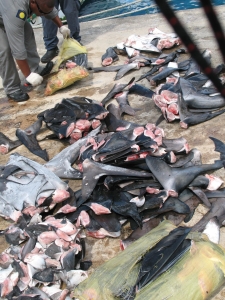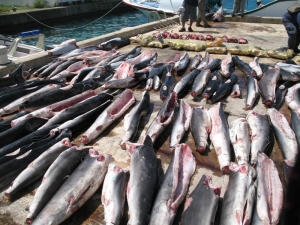CARL’S BLOG HAS MOVED!
Posted in About
Japan. Aargh.
– Carl Safina
Pattern recognition: An international tuna commission that Japan belongs to sets catch levels, then Japan is found guilty of systematic, planned overfishing. An international commission that Japan belongs to bans commercial whale hunting, but Japan continues killing whales for commercial sale, while widening its kill to more species in more regions of the world seas. During four-decade-plus membership on the Atlantic tuna commission (ICCAT), Japan has consistently demanded catches higher than the commission scientists recommend.
Get the picture?
A panel hired by the commission to review itself actually said that the commission’s management, particularly of bluefin tuna,
“…is widely regarded as an international disgrace and the international community which has entrusted the management of this iconic species to ICCAT deserve better performance from ICCAT than it has received to date.”
There is plenty of blame to go around. The U.S. has be a terrible player, too, because its delegation to the commission is always infested with fishing industry lobbyists and even its science team is infected by industry consultants.
With Atlantic bluefin populations now at fractions of former abundance and their numbers plummeting, the United Nations did its own review. The U. N. determined that the tuna commission had so failed that the bluefin qualifies for a trade ban under the Convention on International Trade in Endangered Species.
A trade ban would knock the wind out of the fishing pressure and the prices paid, because about 80 percent of Atlantic bluefins go to—guess where—Japan. That’s because—guess what—sushi-crazed Japanese buyers pay prices sometimes exceeding $150,000 for a single fish. That’s wholesale. One fish.
Bluefin tuna are now so scarce that without Japanese pay-outs, most of the fishing would be a money-loser. So a trade ban would likely arrest the bluefin’s tailspin and might even calm the fishing fervor enough to allow an overhaul of the tuna commission and establishment of more scientific, less corrupted management.
Though there’s plenty of blame to go around in making the Atlantic tuna commission into an “international disgrace,” Japan has created for itself a special distinction: Japan is the only country that has said to the world, ‘screw you all.’
Japan says that if a trade ban is finally enacted—it will simply ignore it. That means that Japan is announcing its creation of a massive black market for bluefin.
http://www.nytimes.com/2010/02/20/business/energy-environment/20tuna.html
Enacting a trade ban is a torturous political procedure. I tried to get one established in the early 1990s—when the writing was already on the wall for bluefin tuna. Japan crushed that effort by threatening lots of poor countries with loss of economic aid if they voted for it. (That debacle is detailed in my book, Song for the Blue Ocean.)
With the fishing situation so much worse now, the trade ban proposal is gaining much more momentum. The vote will come in March when about 150 countries convene in Qatar to vote on an array of wildlife trade proposals.
Japan’s announcement that it will ignore the vote of a global organization it belongs to is like running a pirate flag up the mast.
In an increasingly crowded world where shared management is the future’s only hope, Japan consistently harms efforts to struggle toward agreement. When it comes to the ocean, Japan is a truly a piratical nation. What Somalia is to oil tankers, Japan is to tuna and whales.
With characteristic shamelessness, Japan’s top fisheries negotiator said his country “would have no choice” but to ignore a ban. “It’s a matter of principle,” he said.
Principle?
Posted in Bluefin Tuna
Evolution: Only a Theory
Last year on Charles Darwin’s 200th birthday The New York Times carried an article of mine (http://nyti.ms/2vMcjP) for which I took some heat from Darwinian fundamentalists because they thought I was “dissing” Darwin (everyone who thought so has no sense of irony and basically can’t read, but that’s why they’re fundamentalists. Anyway—.) In honor of Charles Darwin’s birthday on February 12 (he was born in 1809), here’s another thought on the great man.
This was deleted from the above essay for space reasons, but it’s included in my upcoming book, The View From Lazy Point:
Evolution: Only a Theory
Carl Safina
That we’re all related by common ancestry is the most fundamental discovery about living things. Religion long ago intuited this; in the Abrahamic religions, God creates all creatures, so in one sense we have always considered ourselves siblings within a family of life. Evolutionary biology and genetics are the scientific mineshafts that get deep into the motherlode discovery: living things change.
The biggest misconception about evolution is that it’s “only” a theory. To most people, a theory is an untested hunch. But in science, a hunch is called a hypothesis. If a hypothesis is tested and confirmed repeatedly, and if all the confirmation creates a pool of knowledge useful for predicting events, the knowledge is called “theory.” That’s very different than a hunch. Imagine a child sitting at a piano for the first time. They notice that some keys sound dissonant together, and others harmonize. Eventually, the child may know how notes will sound before hearing them played; that’s music theory. It’s not “just” a theory. It’s an understanding of music so thorough that one could—as Beethoven did—compose a symphony despite being completely deaf. Listen to Beethoven’s Ninth and you’ll feel the power of theory. This predictive sense of theory is the same way scientists use the word. Atomic theory predicted that a series of procedures would cause a big explosion. Germ theory predicts that if surgeons wash their hands, fewer people will die of infections. Evolutionary theory has the same proven power. It’s not a guess. When insects and bacteria develop resistance to antibiotics and pesticides, that’s evolution. We’re not surprised when they develop such resistance, because of evolutionary theory. For all of civilization, plant and animal breeders who created new strains by selectively breeding individuals with desired traits were, without naming it, using evolutionary theory.
Evolution is as scientifically accepted as gravity. And while we don’t quite understand how gravity works, we know a lot about how evolution works—much more than Charles Darwin, even with all his genius, could have dreamed.
Evolution is not just the making of new species—the question that obsessed Darwin. And it’s not the progress from Protista to say, Protestant. Very primitive things are also evolving now (like the AIDS virus). And plenty of evolution brings neither new species nor progress. Sometimes the progress goes backwards; the ancestors of whales and snakes had legs, and on islands lacking predators, bird species sometimes lose the ability to fly.
Evolutionary theory predicts that the more diversified the living enterprise, the more it will adapt to change. The more diminished, the more trouble it will have adapting. And changes are coming, faster than before, that will challenge us all to adapt. We can predict some important things about how life on Earth is likely to change, and plan to cope, because evolution is a theory.
Posted in Blogroll, The View From Lazy Point
Corporate Money
The following is adapted from my upcoming book, The View From Lazy Point; A Natural Year in an Unnatural World, which will be published by Henry Holt in the fall. This excerpt is a little long for a blog—but very short for a book.
An Environmentalist Looks at the Supreme Court’s Corporate Money “Decision”
Carl Safina
The modern environmental movement originated as a response to unregulated pollution. But more important than its origin, even more important than the movement itself, is when and where that origin was possible. Environmental movements arose not in the most polluted places on Earth, but in the most democratic, including the United States, Canada, and western Europe. The growth of environmental activity elsewhere often paralleled the overthrow of authoritarian and military regimes and the rise of democracies. When Vaclav Havel became president of a newly democratic Czechoslovakia in 1990, he lamented to the Czech people, “We have laid waste to our soil and the rivers and forests… and we have the worst environment in the whole of Europe today.” The previous repressive regime’s suppression of citizen groups, the press, universities, and other potential sources of objection allowed it to pollute with impunity while people stood powerless. Nature is most abused where human rights are most abused. A country serves justice, or it doesn’t. When it doesn’t, it poisons air, water, and soul alike. When it does, the environment becomes a key toward unlocking justice—but free people must hold those keys.
Saving the world requires saving democracy. That requires well-informed citizens. Conservation, environment, community, education, family, health, economy, easing poverty—these comprise one quest: liberty and justice for all. Whether one’s special emphasis is global warming or child welfare, the cause is the same cause. And justice comes from the same place being human comes from—compassion.
The main point of a democracy—protecting the best interests of the many from the greed of a few—is accomplished by having “the many” run the government. The social contract is that people voluntarily give some rights to a citizen-run government that serves social order and the public interest. That was the idea.
But the body politic has a parasitic infestation that bleeds us weak. Just look at the multinational corporations, corporate lobbying, and the resulting taxpayer subsidies that flow.
Political institutions can’t correct these economic forces—or even stop feeding corporations with public money—because they’ve been captured by them. Each year globally, governments pay $700 billion in subsidies that help pay people to over-pump groundwater, over-cut forests, over-fish oceans, and overuse fuel. The world taxes itself to pay for its own destruction. That’s the worst kind of socialism, brought to us by the worst kind of capitalists.
Modern corporations were essentially illegal at the founding of the United States. (The colonists had had enough of British corporations.) In the new country, corporations could form, raise public capital, and share profits with stockholders only for specified activities that benefited the public, such as constructing roads or canals. Corporate licenses were temporary. Corporations were forbidden from attempting to influence elections, law-making, public policy, and civic life. Imagine.
But from the beginning, corporate-minded men chafed for power, prompting Thomas Jefferson to write in 1816, “I hope we shall… crush in its birth the aristocracy of our moneyed corporations, which dare already to challenge our government to a trial of strength and bid defiance to the laws of our country.”
For the first century after the American Revolution, legislators maintained control of the corporate chartering process. Then they essentially lost it as series of court decisions established corporate “rights” and corporate “personhood.” These have been catastrophic for democracy, with planetary implications.
We didn’t need the U.S. Supreme Court to tell us that corporations have the same rights of “free speech” as real persons. Of course they do—much freer in fact than normal humans, since they can buy air time and advertising, dose candidates with fairy dust, and mobilize paid persuaders in quantities out of the orbit of the budget of any real real person. Corporations have free speech. Normal humans, not so much.
Our problems are not the inevitable price of progress. They are the eventual cost of stupidity, ideology, superstition, greed—the list is short. The problems spawned, vast. They’re intractable, but not because we lack know-how. Intractable because we can’t find the sense that informs the will.
The 1980s saw the democratization of greed. That avuncular Trojan Horse of corporate greed, Ronald Reagan, helped replace the ethic of “all for one and one for all” with “all for me,” immortalized by the movie Wall Street’s Gordon Gekko, who says: “Greed is good. Greed works. Greed is right.” Be greedy and feel good about yourself. Everyone wanted to feel good about themselves, so a generation embraced greed.
Bill Clinton got seduced by de-regulation’s easy feel-good, as did the unmentionable administrations that bookended his. The only problem was, the regulations they all deregulated were built up over a century for a very good reason: the public needs to defend itself against greedy excess.
All in all, deregulation dealt a devastating blow to the social contract and the idea that we’re all in America together, with both feet. The divisive partisanship, the scream-radio freak-show, and the fiscal recklessness that followed were an inevitable result of the lost discipline and the lost sense of common-cause. And by the time everyone realized their pockets had been fleeced, the fleecers had fled, beyond law, beyond regulation—beyond national borders. But not everyone lost out; you glimpse a winning ticket, for example, every time you read the words, “Made in China.”
Corporations have swept real economic and political power away from most governments. Of the hundred wealthiest countries and corporations listed together, more than half are corporations. Exxon Mobil is richer than 180 countries—and there are only about 195 countries. Without the responsibilities or costs of nationhood, corporations can innovate and produce at unprecedented speed and scale. Yet they can also undertake acts of enormous social and environmental destruction and report a profit.
The behavior of corporations arises from their wide freedom of action and their limited liability for harms caused. Further, shareholders “own” and profit by the corporation, but “limited liability” means shareholders can lose no more than the money invested; they aren’t held responsible for anything the corporation does. If they were, stockholders might know what companies they “own” and why. They might demand corporate responsibility. They might invest more carefully. But because they’re not, they don’t. Further, if a corporation can make a larger profit by wrecking a community, the law says it must.
Perhaps the most famous case in corporate law was decided in the Supreme Court of Michigan in 1919 when Henry Ford got sued by the Dodge brothers (yes, those Dodge brothers) Ford wanted to plow profits back into the company and its employees. “My ambition is to employ still more men,” Ford had been quoted as saying, “to spread the benefits of this industrial system to the greatest possible number, to help them build up their lives and their homes. To do this we are putting the greatest share of our profits back in the business.” The judges posed a short question: what is a corporation for? The judges answered themselves by saying corporations are “primarily for the profit of the stockholders” Not for employees or communities. Corporate managers—regardless of personal scruples or desire to ‘do good’—are forced to put profits always first.
The profit-maximization imperative creates continuous pressure to dump waste in the public commons, and to shift the resulting costs to the public through subsidies, tax-funded pollution clean-ups and such. Where dumping waste is illegal, corporations may be fined for violations. Such fines often become “a cost of doing business,” while shareholders know corporations never get sent to jail, and that some are “too big (to be allowed) to fail.” To the extent governmental regulations get annoying, corporate appetites engulf those too, backing and basically installing cooperative elected officials, then stoking themselves with subsidies, and then coercing the removal of regulatory “barriers” (formerly: “public protections”).
In real life as we know it, the profit-maximization imperative means that any company seeking to act responsibly incurs a competitive disadvantage. The implications are generally a cascade of catastrophes, because it means, essentially, that all the money in the world is under pressure to act irresponsibly. Any other impulse must buck that tide.
Now, the Supreme Court has sent America a new blast of partisan hot air that has caused corporate money to burst the century-old levees that had so tenuously restrained it within such imperfect channels. Who does not fear this? It is hard to see how democracy won’t be catastrophically flooded, and the voices of real people utterly drowned, in the oncoming deluge of corporate cash.
Posted in Blogroll
Pemba Foundation
A New Foundation to Help Conservation and Development on an African Island in the Indian Ocean
By Carl Safina
Television documentary producer John Angier and I not long ago visited an island off the coast of Tanzania called Pemba. We were filming a pilot for a possible television series called Saving the Ocean. We went to see how local fishers and mosques were working to conserve coral reefs, mangroves, and other aspects of their natural environment. No small task in a poor place with burgeoning population. Most of the people have no electricity; many homes are made of mud, and opportunities are nearly non-existent. Yet we were moved by both the acuteness of their needs and the sincerity of the people. (see my blog post from that trip at: http://bit.ly/cOMlJf
Subsequently, John Angier helped put a young man we met there through computer training, and now he has landed a good job as a secretary for an Australian company that is rebuilding a terrible road between two villages called Chake Chake and Wete. That’s one life totally changed. (That young man, named Nassor, was an obvious go-getter, taking every opportunity to hang around with us. His mother even baked us a cake. But he had zero money and zero opportunities, and it was John’s follow-up correspondence and assistance that really changed his life.)
Angier has also been corresponding with the people working to protect their coral reefs, about projects to benefit their 36 fishing villages. Now he is setting up a non-profit called the Pemba Foundation through which to raise funds for further assistance. The foundation’s work will not be aimed exclusively at coastal issues, but the first focus will be working to improve life in Pemba’s fishing communities.
Angier’s been kind enough to ask me to be on his founding board. He says, “If we do this right we can help marine conservation at the same time.” It’s the beginning of a process,” John says, adding with prudent caution, “but I think I can see that it might work.”
Obviously this kind of thing is nothing without local contacts, and we had a good feeling about the MICA guys from the first time we met them. In all our dealings with them, they’ve seemed honest and well-intentioned, two qualities in short supply in many better-endowed quarters.
Tortoise Trust Web – Walmart turtle abuse
This was just forwarded to me and is sufficiently disturbing that I am posting it in its entirety here.
Please send those letters to Walmart!
—Carl Safina

|
TortoiseAid International Action Alert CRUELTY AT WAL-MART The Wal-Mart website (http://walmart.com) boasts a large “pet section,” offering everything from pet strollers to dog clothing. In addition, American pet search and adoption services are available through Wal-Mart’s “Very Best Pet Network.” (http://www.verybestpetnetwork.com) Unfortunately, Wal-Mart operates differently in China. While giving North American customers the impression that Wal-Mart cares about animals, they sell others for slaughter out of the sight of Western customers. Live turtles and frogs are available for purchase at Chinese Wal-Mart stores. These animals are slaughtered while fully conscious, to satisfy consumers need for “fresh” food items. “The last things the turtles see in the Wal-Mart megastore in northern Beijing are bright fluorescent lights, masked shop assistants and, if they crane their necks over the edge of their plastic container, a chalk board offering them for sale at the bargain price of 39,8 yuan (about $5) each. Once that sum is paid, even their shells cannot protect them. They are whisked off to the in-store slaughter counter, where their necks are cut, their blood is drained and they are bagged and tagged ready for the checkout counter. According to the shop assistant, a small minority of the 100 turtles sold every day could also expect a brief respite. “A few customers like to take them home alive so they can play with them for a few days before making them into soup,” she said.” (1) We are saddened and horrified that Wal-Mart would employ such barbaric and inhumane practices. Many species of turtles have become critically endangered in Asia due to over-collection and human consumption. Please see the following links for more information regarding the Asian Turtle Crisis: http://tortoise-aid.org/asianturtles.html Please also see a report to the California Department of Fish and Game regarding the sale of live turtles and amphibians in San Francisco, California. http://www.tortoisetrust.org/activities/foodmarket.html Until Wal-Mart ceases this environmentally and ethically unacceptable practice, we are asking for a world-wide boycott of Wal-Mart, and all Wal-Mart divisions. These businesses include: Sam’s Club: USA, Canada: http://www.samsclub.com For a complete list of Wal-Mart owned businesses, please go to: http://en.wikipedia.org/wiki/List_of_assets_owned_by_Wal-Mart_Stores,_Inc . We kindly ask that all individuals, humane organizations and businesses objecting to Wal-Mart’s cruel practices, and who support this boycott and voice your concerns to: Wal-Mart Stores, Inc. You may contact Wal-Mart via e-mail at its corporate web site: More information will soon follow at our web site. Annie Lancaster |
Posted in Sea Turtles
Health of our oceans calls for a unified national policy
The following OpEd by Carl Safina appeared in Newsday on January 14, 2010:
Newsday (New York)
January 14, 2010
Taking too much out; putting too much in; That’s the classic problem with how we treat our oceans; a unified policy will help
BYLINE: BY CARL SAFINA. Carl Safina, author of several books on the ocean, is an adjunct professor at Stony Brook University.
SECTION: OPINION; Pg. A33
LENGTH: 641 words
I grew up a Brooklyn boy, drawn to my coastline from the very start. Out with my dad on the boats of Sheepshead Bay. Catching snappers or nighttime crabbing from the Cross Bay Boulevard bridge. Surfcasting with my father at dawn at Jones Beach. Trolling aboard my uncles’ boat off Coney Island or battling astonishing bluefin tuna off Sandy Hook. All of these, heaven for a kid in my single-digit years and early teens.
Later we moved to Long Island and I fished the shores and bays. Later still I did my graduate studies in New York waters, studying seabirds – and still fishing. That’s when it hit me: The ocean was the last buffalo hunt; all the fish, year after year, were declining.
Right here on Long Island, we’ve had severe declines in fish and shellfish populations, including some of the most valuable species caught in New York. Some are recovering, others continue declining.
Part of the reason so many of our country’s fisheries – from Maine to Hawaii – are in turmoil is the confusing tangle of management hurled their way. It’s not just overfishing or rates of unwanted fish discarded. It’s also damaged seafloor. Lost fishing gear. Trash. Sewage. Chemical pollution. Eroding shores. Shrinking wetlands. It’s taking too much out while putting too much in.
Right now, our oceans and coasts are governed by more than 140 laws and 20 different agencies, each with different goals and often conflicting mandates. There’s no unifying policy or coordination. Instead, we are managing fishing one species at a time, treating fish as if they exist in a vacuum – just them and the water – when in reality fish and fishing communities rely on their ecosystem, other species, healthy habitats and clean water.
In order to value each piece of the puzzle, we need to have the big picture in mind. You can’t do that if agencies responsible for certain pieces are assembling their portion of the jigsaw puzzle on separate tables.
Fortunately, the Obama administration is working to change that. It’s creating a national policy that will offer landmark (seamark?) protection for our oceans. A national ocean policy will help protect our seas and the people who depend on them – which happens to include everyone; half the oxygen you breathe is produced by ocean plankton. From collapsing fish populations and pollution, to warming temperatures and rising acidity – a national ocean policy strengthens the country’s ability to tackle these challenges. This will help us rebuild struggling fisheries and keep fishermen on the water for years to come.
We require a lot from our seas – fishing, shipping, recreation, energy development, wildlife habitat. That’s why, within this policy, the administration is also working to create a process to help us plan ahead. Without a system of coordination like this, we’ll see escalating ocean sprawl and people at cross-purposes, with little thought given to selecting the best places for particular uses. Further stressing our already-imperiled seas jeopardizes the future of the food, jobs, and recreation they now provide.
The oceans are a huge part of our lives and our economies. New York’s ocean sector industries contribute more than $24.6 billion to the state’s gross domestic product. Long Island Sound businesses alone contribute roughly $8.5 billion a year to the regional economy through boating, fishing, swimming and tourism. As a saltwater fisherman and ocean scientist, I know firsthand that the stakes are high if we don’t address the problems facing our oceans.
The Obama administration is charting the course for healthy oceans and abundant fish populations. This focus on our seas is unprecedented, and it is crucially needed. For our future, the future of our children and our grandchildren, let’s all urge the administration to adopt a strong ocean policy in an executive order from the president.
Posted in Climate Change, Fish, Fishing and Fishermen
Climate Denial is Stupid and Unpatriotic
Reality: The atmosphere is as thin as shellac on the globe. Where does all the exhaust go? Into that thin, thin layer. We measure carbon dioxide from the exhaust, and find it climbing every year. Physicists have learned that it traps heat. We measure the temperatures worldwide and find them warming. If we’re wrong about all of that, we can look at satellite photos of the polar seas and see how much ice has melted in recent years. Same with almost all the glaciers. In the tropics, reefs have started dying due to excess heat and due to water turning acid from carbon dioxide only since the 1980s. I’ve seen this all with my own eyes.
Stupidity: The idea that the climate scientists in the world are in a conspiracy to lie is just insane. People who think that are either nuts or are being manipulated by the greed of those whose ox will be gored. Even in the days of big tobacco, they never raised such a ridiculous claim against all of science.
Morality: Consider the last energy conversion: Slavery to oil. Slaves are much cheaper. They create a very nice life-style. The economy would collapse without our freedom to have slaves. Obviously, this moral rot is an absurd argument. And this absurdity was vehemently held, and viciously, bloodily defended. Pretty much like today.
Practicality: The world is warming and we’re warming it. That is indisputable. It will have great negative consequences; that’s also indisputable. Denying it won’t change it.
And–no one needs to give up energy. We only need to convert from caveman energy (burning something every time we need energy) to clean energy that powers the whole planet (sun, wind, the energy in the ground, with nuclear as a possible bridge). No one cares whether the energy comes from oil, coal, slaves, sunlight, or wind, as long as the light goes on when you flick the switch and the car goes when you step on the pedal. Except that, wait, we do care if it comes from slaves because that’s immoral. Well, wrecking the future is also immoral. Today’s slaves are our own children whose options are closing because we’re dictating the world they’ll be stuck with.
Patriotism: As China and Germany and Denmark know, far from wrecking the economy, building and exporting the high-tech technology for capturing clean, free-flowing energy and the grids for distributing it will involve tremendous investment and job opportunities.
The United States is falling farther behind in developing these technologies; other countries are positioning to leave us in the dust. The unpatriotic people are not the ones who want the U.S. to lead in developing clean energy. It’s the ones who don’t.
– Carl Safina
Posted in Climate Change
International agreement greatly helps albatrosses
Getting hooked and drowned on fishing gear has been the greatest causes of death for adult albatrosses for several decades. The main problem is lines dozens of miles long with thousands of baited hooks, called long-lines. For a decade, conservation groups including Blue Ocean Institute and Birdlife International’s Global Seabird Program and others have worked with fishing boat owners and with governments, partly through an international treaty called the Agreement of the Conservation of Albatrosses and Petrels.
Positive results have been dramatic. For instance, from 2007-2008, measures taken by predominantly Japanese fishing boats reduced albatross mortality by 85% off of South African waters. This is a huge success and an important step toward seabird conservation for a country with an enormous longline fleet. Other areas with great reductions in albatross fishing deaths in recent years include waters around Hawaii, Alaska, the Falkland Islands, Australia, New Zealand and some other places.
In the mid-1990s, many people feared this problem would cause the extinction of many albatross species (more than 20 species exist). Now, there is definitely hope.
-Carl Safina
Posted in For the Birds
Making A Difference – Palau Creates World’s First Shark Sanctuary
Yesterday the Associated Press ran a story about the Western Pacific nation of Palau, who announced today at the United Nations its ban of shark fishing.
 Carl Safina reflects on how shark populations have plummeted over the years and that Palau is making groundbreaking efforts to reverse this tragic trend:
Carl Safina reflects on how shark populations have plummeted over the years and that Palau is making groundbreaking efforts to reverse this tragic trend:
I and everyone I’ve ever spoken to in any ocean can tell you that sharks are much scarcer than in the 1980s, and that catch rates are much lower. In fact, some species have virtually vanished from large areas.
Many older fishermen can tell you that sharks were abundant swimming near the surface in the 1960s, and that they’d usually see 50 or more over the course of a day. In those days, “finning” meant swimming along the surface with their fins sticking out of the water.
Most impressive to talk with, in my experience, are people who used to be aerial swordfish spotters here in the Northeast US. They can tell you there were so many sharks through the 1970s that the hardest thing about finding a swordfish (which were common then, too) was to spot one amidst all the sharks.

photo courtesy of Dan Klotz
While diving in Palau earlier this year, I had the impression that sharks remain common but not as abundant as in the mid-1990s.
Some sharks range large areas, so even shark fishing hundreds of miles away could greatly affect shark numbers in another area. However, this shark sanctuary is very welcome news. It’s big enough that if it can be patrolled effectively—and that’s a big ‘if’—it could make a real difference for the shark population of Palau.
Palau has continually done an outstanding job of turning living fish into sustainable cash. Early on, Palau banned the export of reef fishes, and as a result it has some of the best reef fish populations remaining in the world.
As reefs deteriorate and get stripped of fish elsewhere, Palau becomes increasingly valuable not just biologically but as a tourist destination, an ongoing cash cow for Palau itself. It is perhaps the best place in the world to see large humphead or Napoleon wrasse, now rare elsewhere. And because certain fish graze algae from coral reefs, overfished reefs elsewhere are overrun with coral-smothering algae.

photo courtesy of Dan Klotz
By contrast, Palau’s reefs are not only healthy but actually have recovered from widespread coral bleaching in the late 1990s. The bleaching was caused by abnormally hot water related to global warming. In most places, a reef with so many dead corals would have been quickly overrun by algae that would have prevented corals from regaining their foothold. That means the end of coral reefs in some areas. But in Palau, the still-abundant fishes suppressed the algae, allowing reefs to recover.
Palau’s visionary protection of reefs and the banning of shark fishing are policies of very high value not just to Palau itself, but increasingly, for the rest of the world as well.






You must be logged in to post a comment.